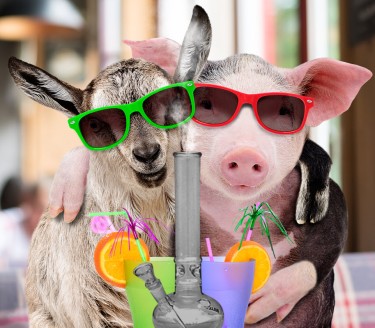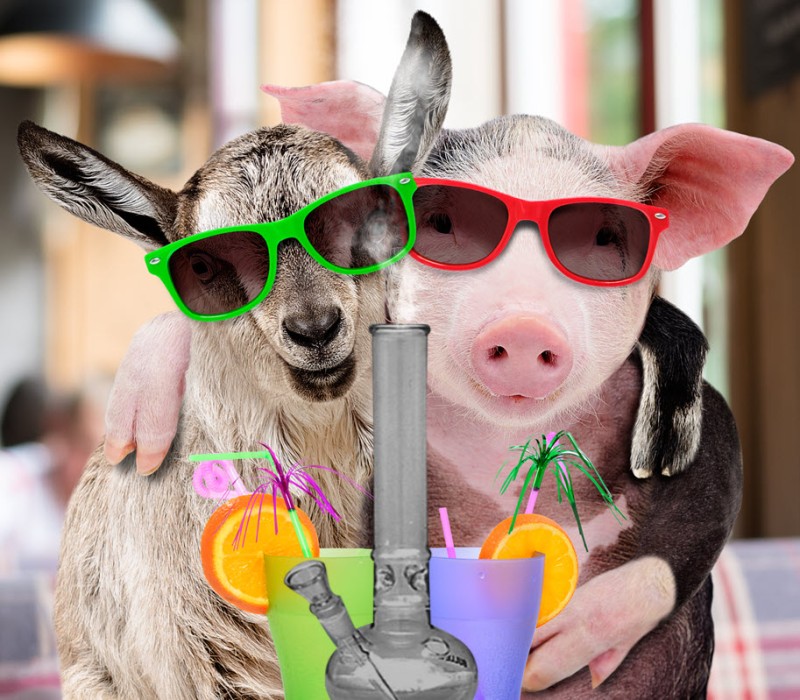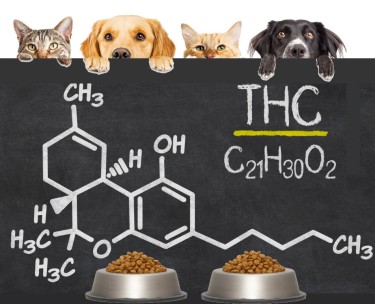
We know that cannabis is a very useful natural medicine for us humans, as well as our companion pets primarily dogs and cats. Our furry family friends have long been enjoying the benefits of this life-saving medicine as it is widely used to help treat their anxiety, cancers, and other ailments while also ensuring that senior pets get the quality of life that they deserve.
But what about other animals as they consume THC?
Here’s what the studies say about the impact of cannabis on other animals:
Hemp Puts Cows In A Mellow Mooooood
A new study out of Wichita in Kansas reveals that when cattle were fed industrial hemp, their stress levels were significantly reduced and – no surprise here – it made them lie down for much longer. ‘
The study, whose results were published in the journal Scientific Reports, involved 16 Holstein steers; half of them were given traditional feed while the other were given a mixture of traditional feed combined with industrial hemp. The hemp contains cannabidiol (CBD), the non-psychoactive compound of cannabis that is known for its relaxing properties, which has significantly less tetrahydrocannabinol (THC), which gets you high.
The cattle’s behavior and movements were tracked by the researchers. They also analyzed their blood to look out for stress biomarkers, which are prostaglandins and cortisol.
According to K-State College of Veterinary Medicine assistant professor Mike Kleinhenz, discovering that there is a natural way to calm cattle down is beneficial. Relaxed cattle are often much healthier, which is something we also notice in humans. Hemp could be a safe, alternative way to reduce stress-related infections as well as other conditions they are prone to when baby cattle have to be weaned from their moms and be transported.
“We might have a more natural way to reduce stress in cattle,” Kleinhenz explained. “And we’re just starting to scratch the surface on some of the benefits,” he said.
The steers who ate the hemp mixture were found to have lower stress hormone levels compared to the control group. Additionally, they saw that the cattle absorbed the hemp though it didn’t accumulate in their systems.
“It was kind of an exploratory study that yielded some really interesting results,” he says. “You usually don’t go fishing and find stuff like that.”
Back in 2020, the K-State College team were given a $200,000 research grant thanks to the US Department of Agriculture; these funds were intended for their team to study how safe it is to use industrial hemp as cattle feed. If the byproducts of hemp were found to be viable livestock feed, this would be of great help to ranchers while also reducing the waste that goes to landfills.
“Basically it’s the old cow recycle system” said Kleinhenz. “Similar to the ethanol story, where cattle are fed distillers’ grains from ethanol production.”
So they get to hit two birds with one stone: healthier, chilled-out cattle, while also saving the environment.
Donkeys Are Prone To Cannabis Poisoning
Meanwhile, when it comes to donkeys, studies show that they can’t metabolize cannabis the way others do.
A study released earlier this year in the Journal of Veterinary Diagnostic Investigation revealed that when male and female donkeys, known as a jack and jenny, were given a few grams of marijuana suitable for human consumption, what happens to them is a lot like what happens when you get too high. The donkeys ended up with an abnormally fast heart rate and were lethargic. This went on for some 44 hours until the jenny had to be hospitalized.
This is the first known study of donkeys consuming cannabis.
“Marijuana toxicosis is typically seen by companion animal veterinarians. However, with increased marijuana availability, there is a greater potential for toxicosis in other species,” write the researchers.
However, it wasn’t all bad: the researchers also had the opportunity to test processes which could verify the symptoms were directly caused by cannabinoids. They utilized a “screening assay in collaboration with a veterinary diagnostic laboratory,” which they say “may be useful when an equine practitioner suspects marijuana toxicosis in a patient.”
Hemp for Horses a Growing Health Trend
In the equine industry, there is a growing trend of using hemp products for horses.
“Hemp is hardy and fast-growing, and can be harvested for industrial and commercial products such as rope, clothes, paper, textiles, plastics, and biofuel,” said Kentucky Equine Research nutritionist, Kathleen Crandell, Ph.D. The main benefits of hemp for horses include using it in bedding, as well as hemp seed oil.
“Hemp oil contains omega-3 fatty acids, which are known for their health benefits,” she added. “Supplementing omega-3 fatty acids also helps balance the ratio of omega-3s and omega-6s in a horse’s diet and facilitates the absorption of various fat-soluble vitamins, including A, D, E, and K,” says Crandell.
‘The nervous system of both mature and immature horses also benefits from omega-3s as supplementation decreases stress, improves learning and cognition, and staves off the development of stereotypic behaviors, such as cribbing,” said Crandell.
“Hemp oil is not as high in omega-3s as the more tried-and-true fish oil, and may not be effective at balancing the omega6:3 ratio if the diet is really high in omega-6s,” Crandell explains.
In addition, there are other benefits that horses can enjoy from being fed with hemp. These include anxiety, chronic laminitis, stall rest, muscle soreness, herd-bound issues, and so much more. Hemp has been well-tolerated in horses and continues to be a valuable tool among horse owners.
Conclusion
Hemp and cannabis products have varying effects on animals. Before you decide to feed an animal with cannabis, be sure to look up the research and speak to your veterinarian so they can recommend the appropriate options available.
THC FOR ANIMALS, PETS? READ MORE...
IS THC SAFE FOR PETS LIKE DOGS AND CATS, READ THIS!







